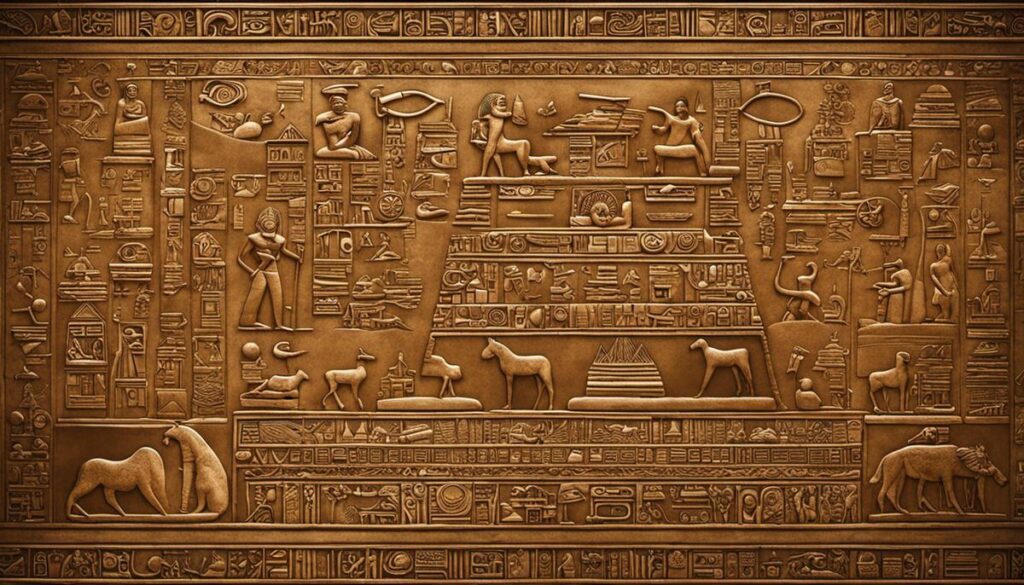Delving into the realm of biblical narratives, one encounters a rich tapestry of symbols, allegories, and metaphysical elements that collectively shape the essence and structure of the Biblical world. One aspect that commands particular attention pertains to dreams and their interpretation within the biblical context. This discourse seeks to highlight the theology of dreams in the Bible, the symbolism of food in biblical doctrine, and finally, an interpretation of the often intriguing dream scenario of receiving food from someone else in a biblical sense. The journey towards understanding these abstract concepts promises to be not only enlightening but also revelatory, enabling us to view the world, and our dreams, through the prism of biblical teachings.
Theology of Dreams in the Bible
The Exploration of Dreams in a Biblical Context: A Comparative Study and Interpretation
The realm of dreams holds a profound significance within biblical narratives and discourses. This fascinating area of study invites us to delve deeper into the complex tapestry of biblical symbolism and imagery. Throughout the scriptures from Genesis to Daniel, dreams have been a frequent narrative device that not only shapes the fate of characters but also crafts the theological framework and human understanding of divine communications.
One can observe this fascinating interplay in various instances; dreams are often considered conduits for divine messages. Starting with the Old Testament, we encounter some of the most iconic dream sequences, such as Joseph’s in the Book of Genesis. Here, dreams serve as prophetic communication and earn young Joseph the role of a seer blessed with the ability to interpret dreams – a pivotal moment that inevitably alters his life.
Further along, we encounter the story of the Babylonian King Nebuchadnezzar in the Book of Daniel, where again dreams bear significant prophetic weight. In this context, dreams symbolize a higher truth, accessible only to those possessing divine wisdom and understanding—the ability to interpret these encoded messages are equated with wisdom and favor from God.
The theme of divine revelation through dreams does not cease in the Old Testament. The New Testament carries on this tradition, albeit with a focus slightly shifted towards personal guidance and prompting of actions. The dreams of Joseph, the earthly father of Jesus, direct him to take specific actions at critical moments, such as his decision to marry Mary and later, to escape to Egypt.
Furthermore, the Apostle Paul’s vision in the book of Acts, though not labeled explicitly as a dream, is conceptualized with the same reverence and seriousness, signifying a personal divine encounter.
One might argue that the Bible presents dreams as a divine language, a communication medium employed by the divine to guide, warn, and prophesy. However, the interpretation of these dream sequences within the Biblical context remains a crucial factor. The presence of interpreters like Joseph or Daniel, gifted by God to understand this language, underscores the premise that such communications inherently require spiritual discernment.
Despite the abundance of dream narratives, the biblical perspective discourages gratuitous conjecture. In Ecclesiastes 5:7, excessive dreaming is portrayed as the fruit of toil and anxiety, and the Book of Jeremiah warns against false interpretations of dreams. These passages emphasize the need for discernment and wisdom in dealing with dream narratives, a quality to be sought reverently and responsibly.
In conclusion, the exploration of dreams within the biblical context presents a vibrant mosaic of divine-human interaction, symbolic language, prophecy, and guidance from an academic perspective. This analysis underscores the significance of dreams as a unique facet of the biblical narrative, emphasizing the faith’s rich textual corpus and the broad scope of interpretation that it allows. The interleaving of dreams within the biblical narratives presents an exciting journey for theological and terrestrial exploration, replete with vital insights into the profound mystery that is the human relationship with the divine.

Symbolism and Significance of Food in Biblical Doctrine
The Prophetic Nature of Food in Biblical Narratives
Food has had a profound impact on human life from time immemorial, not just for our survival, but also serving as a symbolic, ritualistic, and social construct. In the realm of biblical literature, the presence of food goes beyond the act of gastronomic indulgences or mere matter of sustenance. It often serves as a powerful metaphor, denotes important theological shifts, and even presents divine communication.
In the biblical narratives, the presence of food is commonly associated with the blessing and providence of the divine. For instance, the story of manna from heaven in Exodus paints a vivid picture of God’s sustenance for the Israelites in the wilderness. This food, literally “bread from heaven”, signifies the miraculous provision and characterizes divine deliverance in times of crisis.
The premier example of food indicating a shift in abiding laws can be seen in the book of Acts, during Peter’s vision of the great sheet. The lowering of a sheet, containing a plethora of animals serving as potential food sources, triggered a radical change in dietary laws applicable to early Christian believers. It symbolized a broader acceptance within the faith and marked a departure from long-cherished Jewish dietary restrictions.
Food-related narratives often provide a context for divine teachability as well. The parable of the Mustard Seed in the Gospels uses a seed (a core ingredient in Mediterranean meals) as a metaphor for the Kingdom of Heaven. It showcases faith’s potential to grow from modest beginnings into something significantly impactful, akin to a tiny seed growing into a large tree.
God’s demand for specific offerings of produce, livestock, and grain, as seen in Leviticus, affirms the importance of food within sacrificial contexts. These edicts exemplify divine standard, signify a sacerdotal mediation between humans and the divine, and underscore human responsibility in maintaining holy conduct.
The New Testament’s Last Supper provides an archetypal image of divinely inspired meal sharing. Bread and wine, ordinary elements of meals, become critical signifiers of Jesus Christ’s sacrifice, with the breaking of bread and the sharing of wine establishing enduring religious practices within Christianity.
Food imagery contributes significantly to the apocalyptic imagination in biblical literature. The book of Revelation speaks of a famine and scarcity of food as portents of end times, reflecting the eschatological dimensions of food.
The exploration of food symbolism in biblical literature reveals its multifaceted roles. It is a mirror to cultural realities, divine providence, shifting theological norms, ritualistic practices, and a window into future realities. In essence, the prevalence of food in biblical narratives signifies the intertwining of physical and spiritual sustenance, shaping a comprehensive understanding of human and divine interaction.

Interpreting ‘Dream of Someone Giving You Food’ in the Biblical Sense
Transcending beyond the realms of physical hunger and sustenance, the edible offerings in one’s slumber can have profound implications when understood in the biblical context. Analyzing the sequestered layers of scriptural texts acquaints us with myriad ways wherein food is a symbolic gesture, leaving an indelible impact on our understanding of divine interactions and theological lessons.
In spiritual discourse, to dream of being offered food holds potent allegorical undertones of divine providence. Embedded in the scripture’s text is an indelible motif of nourishment – young Joseph was presented with sheaves of grain in his dreams long before he became Egypt’s provider during the time of famine. Bearing in mind this associative metaphor, a dream about being gifted food might echo the sentiments of divine sustenance and support being extended to the receiver during impending trials or endeavors.
Evaluating the context of alm-giving in dreams against the scenario where God sent manna from heaven in the Book of Exodus, it might suggest divine providence being bestowed in times of need. Much like the Israelites in the wilderness, one might be on the brink of spiritual or material want, and the dreamed food represents divine nourishment that will ameliorate the situation.
To extend interpretations, one can draw upon Peter’s vision in the Book of Acts, where a large sheet full of animals descended from the sky. The vision was not only about food but was a divine command to break Peter’s existing taboos around food, opening doorways for understanding the universality of Christ’s teachings. Thus, offering food in a dream might potentially signify a vital change or progression in the recipient’s spiritual journey or their understanding of divine normative.
Parallels may also be drawn from the parable of the Mustard Seed found in the Gospel of Matthew. As a small seed transforms into a great tree providing shelter and food, a dream of receiving food could imply that the dreamer carries within them an idea or potential that, when nourished properly, can influence their life and those around them profoundly.
Moreover, the evident centrality of food in biblical narratives, such as in the rituals and offerings proscribed in Leviticus or the Last Supper in the New Testament, can associate the dream scenario with divine communion and atonement. The dream then becomes a prophetic beckoning toward spiritual growth or perhaps rectification.
However, caution is advised in interpreting such dreams without considering the symbolic implications of scarcity, as projected in the Book of Revelation. The dream might also be a forewarning to prepare oneself for impending hardships, indicating that spiritual strength will be crucial in face of the adversity.
In the grand scheme of Biblical narratives, food symbolizes physical sustenance intertwined with spiritual fortification. The reception of food within a dream, seen through the lens of biblical interpretation, might represent divine provision, an impending change, potential growth, the need for atonement, or forthcoming trials. Ultimately, the context and emotional resonance of the dream will be instrumental in discerning its precise implication.

As we meander through the Bible’s labyrinthine passages, the symbolism of dreams and food materializes with profound sharpness. A dream of being given food by someone else, when interpreted using biblical perspectives, exposes us to the depth of divine communication, the virtues of sustenance, and the concept of wisdom. While a definitive interpretation may not always be possible due to the unique and personal nature of dreams, we can surmise that such a dream may symbolize divine nourishment, wisdom bestowed upon us, or perhaps an invitation to partake in a divine communion. The captivating confluence of dreams and food in the Bible presents a fascinating vista of exploration, helping us unlock deeper dimensions of spirituality, divinity, and understanding.







